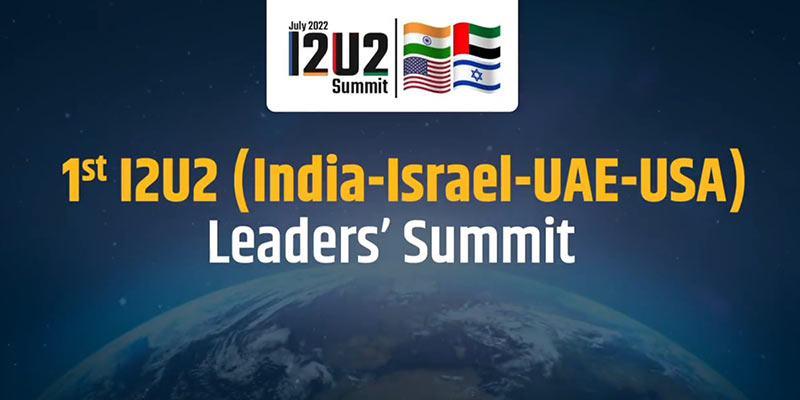- India
- Jul 15
I2U2 summit unveils $2 bn initiative to develop food parks in India
The first summit of the four-nation grouping ‘I2U2’ announced an investment of $2 billion to develop a series of integrated food parks across India and set up a 300-megawatt hybrid renewable energy project in Gujarat.
At the virtual summit, Prime Minister Narendra Modi, US President Joe Biden, Israeli Prime Minister Yair Lapid and the UAE’s President Mohammed bin Zayed Al Nahyan largely focused on joint investments and new initiatives in six specific areas of water, energy, transportation, space, health and food security.
What is the purpose of I2U2?
• I2U2 is aimed to encourage joint investments in six mutually identified areas such as water, energy, transportation, space, health and food security.
• It intends to mobilise private sector capital and expertise to help modernise the infrastructure, low carbon development pathways for our industries, improve public health, and promote the development of critical emerging and green technologies.
• In the grouping’s name, ‘I’ stands for India and Israel and ‘U’ for the US and UAE.
• The I2U2 grouping was conceptualised during the meeting of the foreign ministers of the four countries held on October 18, 2021.
• The formation of the grouping is largely seen as a strategic attempt by the United States to check China's increasing influence in Asia and the Middle East.
• Each country also has Sherpa-level interactions regularly to discuss the possible areas of cooperation.
• India’s bilateral strategic ties with each of the three countries are on an upswing in the last few years.
The I2U2 leaders highlighted the following initiatives:
Food Security: The UAE, home to the International Renewable Energy Agency (IRENA) and host of COP28 in 2023, will invest $2 billion to develop a series of integrated food parks across India that will incorporate state-of-the-art climate-smart technologies to reduce food waste and spoilage, conserve fresh water, and employ renewable energy sources. India will provide appropriate land for the project and will facilitate farmers’ integration into the food parks. Private sectors from the US and Israel will be invited to lend their expertise and offer innovative solutions that contribute to the overall sustainability of the project. These investments will help maximise crop yields and, in turn, help tackle food insecurity in South Asia and the Middle East.
Clean Energy: The I2U2 group will advance a hybrid renewable energy project in India’s Gujarat State consisting of 300 megawatts (MW) of wind and solar capacity complemented by a battery energy storage system. The US Trade and Development Agency funded a feasibility study for the $330 million project. UAE-based companies are exploring opportunities to serve as critical knowledge and investment partners. Israel and the US intend to work with the UAE and India to highlight private sector opportunities. Indian companies are keen to participate in this project and contribute to India’s goal of achieving 500 GW of non-fossil fuel capacity by 2030. Such projects have the potential to make India a global hub for alternate supply chains in the renewable energy sector.
Manorama Yearbook app is now available on Google Play Store and iOS App Store

